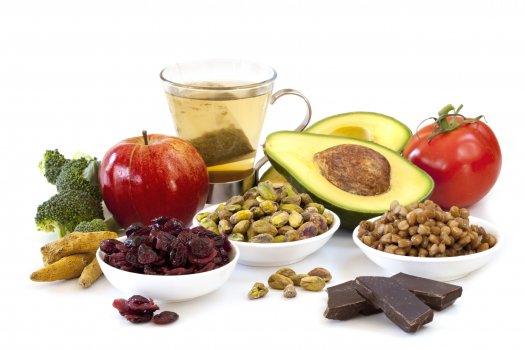HOW TO MANAGE HOLIDAY STRESS AND AVOID WEIGHT GAIN
with Simple Practices and Adaptogenic Herbs
Learn how to manage holiday stress to keep cravings, belly fat, and inflammation at bay. Enjoy more, stress less, and feel better by doing what is really meaningful and tapping the power of adaptogens – special herbs for strength, stamina, and stress relief.
by Kitty Wells, co-founder of Spice Pharm
Holidays can be the best of times, and the worst of times. They can be filled with joy, wonder, tenderness, and cheer. And they can bring on sadness, loneliness, anxiety, and stress.
Holiday stress and holiday weight gain can go hand in hand. With all the shopping, rushing about, traffic jams, swirling emotions, over-amped expectations, financial worries, family obligations, missed sleep, and missed exercise, it’s easy to hit overwhelm and succumb to stress. Combine stressors with holiday sweets, treats, and feasts creating temptations around every corner, it’s easy to put on a pound or two (or ten) over the holidays.
When you’re feeling stressed and hit the cookie tray, eggnog bowl or fast food holiday special, momentary indulgences are more likely to transform into permanent belly fat than if you’re feeling cool, calm, and in control. Here’s why.
The Stress-Weight Gain Connection
When you’re stressed – even just thinking stressful thoughts– your body releases the hormone cortisol. At first, you may feel the positive vibe of cortisol – the rise of energy, focus, and “charge forward” feeling. While it’s often called the “stress hormone,” cortisol is essential for energy and health. When it’s in balance, it rises in the morning, energizing you for the day. It then drops at night, allowing deep, restful sleep.
But when you trigger it with repeated stress reactions, it’s out of balance and you are too. Made in your adrenal glands, cortisol also serves to get you out of danger. When you’re under stress, two of its main jobs are to 1) raise blood sugar to feed muscles so you can run or fight, and 2) curb functions that would be non-essential in a fight-or-flight situation such as digestion, immunity, and sexual functions. With frequent triggering, these actions get stuck in the “on” mode – flooding your system with cortisol and other stress hormones and disrupting almost all of your body’s processes.
Now back to the holiday table or traffic jam. Here’s how stress -- during the holidays or anytime – can cause you to pack on extra pounds:
- Metabolism: Elevated cortisol impacts your metabolism, causing accelerated weight gain even if you’re eating a pretty healthy diet.
- Cravings and Emotional Eating: Stress triggers cravings for fatty, salty, and sugary foods – and causes you to eat more than you normally would, even when you’re not hungry. This one-two punch can blow your healthy intentions straight out the window.
- Blood Sugar: As stress spikes your blood sugar, repeated spikes cause a vicious cycle of mood swings, fatigue, insulin resistance, and weight gain, which in turn makes blood sugar levels harder to control. This can lead to metabolic syndrome, a cluster of health issues that contribute to heart attacks and diabetes.
- Fat Storage: Cortisol and insulin both affect how you store and release fat. When the two hormones are elevated together, it makes storing fat easier and burning fat harder – particularly in your midsection. Fat cells in the belly have 4x more cortisol receptors compared to fat cells elsewhere, so you just keep reinforcing the belly fat as your cortisol climbs and stays high.
- Fast Food: Stressful time pressures and/or cravings can send you straight to the belly of the processed food beast. Burgers, biscuits, pizza, fried things of all kinds, and even specialty coffee drinks like the uber-popular pumpkin spice lattes and candy cane mochas are loaded with sugar, fat, and artificial ingredients that fatten you up and fuel inflammation.
- Lost sleep: Chronic stress disrupts a well-balanced cortisol curve, which in turn disrupts restful sleep, leading to bleary-eyed morning fatigue, mid-afternoon crashes, and more sleepless nights. Sleep deprivation disrupts further hormones that regulate hunger and appetite (ghrelin and leptin), causing you to have a raging appetite and intense cravings for unhealthy food.
Too Busy to Exercise: With extra demands on your holiday schedule, exercise may slide to the bottom of your to-do list. Exercise -- one of the best stress busters and weight managers -- goes by the wayside.
Simple Practices and Adaptogenic Herbs to Manage Holiday Stress and Avoid Weight Gain
Fortunately, there are things you can do to handle stress, reverse the pattern of weight gain, and enjoy the holidays at the same time. When it comes to stress management, sometimes the simplest practices are the most powerful. These are not “tips” which you do once and forget about. They are elegantly simple practices to repeat over and over. Also, a very special class of herbs called adaptogens is scientifically proven to reduce stress, normalize cortisol levels, strengthen your entire neuroendocrine system, increase resilience, and help avoid weight gain.
Try these simple practices and herbs. They work!
 Breathe. The ultimate of simplicity, the biggest challenge of this practice is to remember to do it. When you feel tensions rise, take 10 deep breaths. This super simple and super effective act can recalibrate your physical and emotional state. The holidays are a great time to begin or maintain a mindful meditation, focusing on each breath as you calm your mind. When you’re eating, take 3 mindful breaths between each bite.
Breathe. The ultimate of simplicity, the biggest challenge of this practice is to remember to do it. When you feel tensions rise, take 10 deep breaths. This super simple and super effective act can recalibrate your physical and emotional state. The holidays are a great time to begin or maintain a mindful meditation, focusing on each breath as you calm your mind. When you’re eating, take 3 mindful breaths between each bite.
Practice Gratitude. Ok, you may have heard this a hundred times but it’s true: gratitude is a potent antidote to stress. Cultivating gratitude is one of the simplest practices of creating a greater sense of emotional well-being, higher overall life satisfaction, and a greater sense of happiness in life. When stressors arise, try to think of 4 or 5 related things for which you are grateful. Challenging situations (and challenging people) become more bearable and less stressful.
Simplify and Relax. Let go of pressures -- don’t try to do it all. If you’re feeling financial stress, don’t feel like you need to buy expensive presents. Reach out to loved ones with heartfelt holiday wishes – reminisce about favorite memories and create new experiences instead of buying “things.” Who needs more things, anyway? Share a healthy homemade treat, have a caring conversation, or make art together. Some of the most meaningful gifts are love, attention, and creativity. If you can’t travel to see long-distance loved ones, do a Skype or FaceTime call. Decorating? Do what feels good and no more. Also, feel free to say “no” to invitations that leave you feeling pressed for time. Indulge in self-pampering with your favorite ritual to unwind. Relax with aromatherapy, a hot bath, by meditating, dancing, or snuggling under the covers with a good book or video. Balance the outward-facing celebrations of the season by taking time to enjoy winter’s urge to slow down and go inward.
Choose Healthy Activities. Some of the best holiday activities don’t require expensive tickets -- they take you into nature and get you out helping others. Enjoy the stark beauty of winter and the cycle of seasons by bundling up for a walk in a park, in the snow, in a forest, by a river or ocean – there is beauty wherever you are. Not only is a walk mood-lifting anytime but walking in cold weather helps you burn more calories as your body works harder to stay warm. And remember what the holidays are really about – participating in the community of humankind, whether it’s helping an elder or invalid, reaching out to a friend who’s going through hard times, wrapping presents for needy children, volunteering at a soup kitchen. By giving the gifts that money can’t buy, you can fill your heart with gladness, make the world a better place, and reduce stress, all in one.
Create Healthier Versions of Your Favorite Holiday Treats. A lot of modern “traditional” holiday fare is full of processed sugar, high-glycemic carbs, inflammatory fats, and artificial ingredients that can tank your energy, and mood, and pack on pounds. That doesn’t mean you can’t indulge in your favorite celebratory treats – just find healthier versions! To get started, Google “healthy versions of holiday favorites.” You’ll find lots of inspiration!
De-stress with Adaptogens. Truly exceptional gifts of nature, adaptogens are rare and special herbs that help you adapt to stressors of all kinds. They help your body adapt to biological and psychological stress by helping balance your hormonal systems – particularly your adrenal system and cortisol. Adaptogens help you cope with the stress effects of living in the modern world, giving you energy, focus, strength, restful sleep, and a better overall mood.
Adaptogens are unique plants that help your body adapt, normalize, and strengthen -- regulating your system up or down depending on what you need at the moment. Some of the best-known adaptogens include herbs and mushrooms: ashwagandha, astragalus, cordyceps, eleuthero (Siberian ginseng), holy basil (tulsi), ginseng (American and Asian), maca, reishi, Rhodiola, Shatavari, and Schisandra.
Known as the great tonic herbs in traditional Chinese medicine, and the great rejuvenators in Ayurvedic medicine, adaptogens are non-toxic and can be taken daily for very long periods. Their stress-relieving and energy-boosting benefits accumulate over time, unlike caffeine and stimulants that can deplete your system over time. These remarkable gifts of nature can help de-stress your holidays, the new year, and beyond.
Cortisol Awakening Response (CAR) Profile Kit includes 6 collections throughout the day. To capture this response, three – rather than one – morning saliva collections are needed to properly chart the diurnal cortisol curve within 60 minutes of awakening. The Cortisol Awakening Response – also called CAR – reveals more detailed clues that help in assessing adrenal hormone function. This testing is often useful for cases of PTSD, major depression, chronic fatigue syndrome, and other severe stress conditions. Cortisol Awakening Response Sample Collection 6-Tube Collection: Six cortisol collections in 24 hours is the most common method for assessing CAR. Start saliva collection within five minutes of waking for the day, followed by a second sample at 30 minutes, and a third sample at 60 minutes. The rest of the diurnal rhythm can be assessed at the normal time intervals – noon, evening, and night. Click here for more collection instructions.
ZRT Cortisol Awakening Response (CAR) Profile
 See our ZRT Cortisol Awakening Response (CAR) Profile to check your daily cortisol levels. Samples are taken from saliva.
See our ZRT Cortisol Awakening Response (CAR) Profile to check your daily cortisol levels. Samples are taken from saliva.
Additional Resources
 After 20+ years in the fast lane of Silicon Valley, Kitty Wells left her high-tech career to found Spice Pharm, Inc. and follow her passion for holistic wellness. Recognized for their great taste, scientific efficacy, and innovation, her award-winning Golden Goddess Turmeric Chai and Chocolate Elixirs provide clinically proven stress relief and cortisol management along with antioxidants and anti-inflammatory goodness.
After 20+ years in the fast lane of Silicon Valley, Kitty Wells left her high-tech career to found Spice Pharm, Inc. and follow her passion for holistic wellness. Recognized for their great taste, scientific efficacy, and innovation, her award-winning Golden Goddess Turmeric Chai and Chocolate Elixirs provide clinically proven stress relief and cortisol management along with antioxidants and anti-inflammatory goodness.


